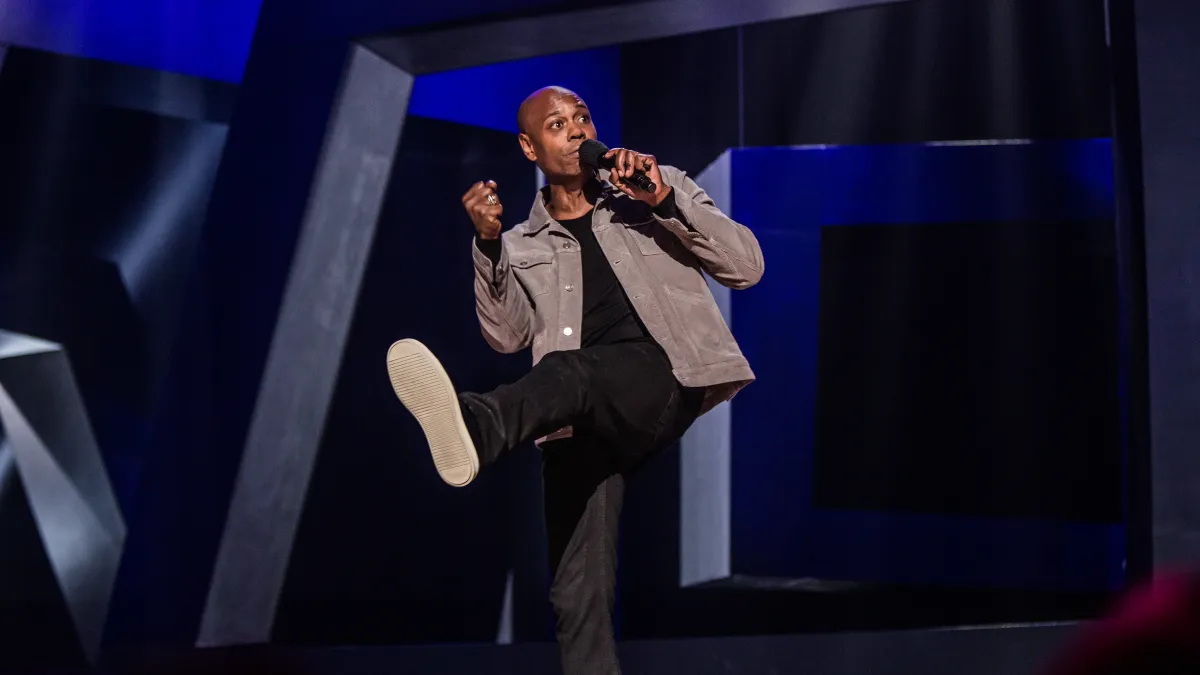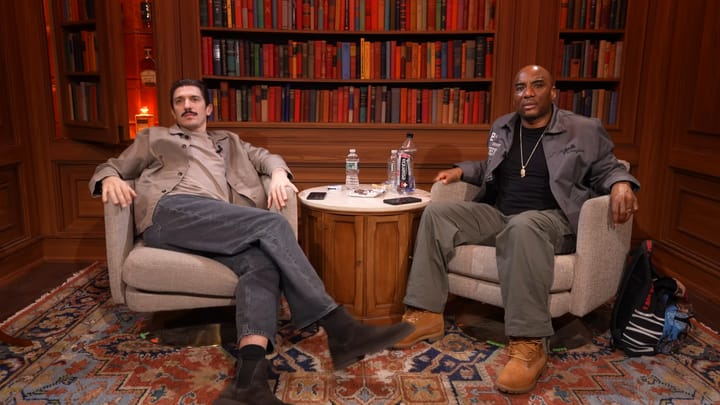Comedians Against Free Speech
Quote them at your own peril.

Here’s something funny. You may remember the hubbub a few years ago when Louis CK and Aziz Ansari started touring again and had venues publish the following legal boilerplate on their ticketing pages, basically threatening to sue anyone who quoted their jokes:
Louis CK owns all rights in the content and materials, including any jokes and sketches (the "Materials), delivered during his performance. The Materials may not be copied, translated, transmitted, displayed, distributed, or reproduced verbatim (the "Use"), in whole or in part, in any form, media, or technology now known or later developed, without the express prior written consent of Louis CK. Any Use of the Materials without the express prior written consent of Louis CK is strictly prohibited and shall be subject to all available legal remedies, whether in equity or at law at the cost of anyone who violates this prohibition.
Oh Brudder Productions [Ansari] own all rights in the content and materials, including any jokes and sketches (the “Materials”), delivered during his performance. The Materials may not be copied, translated, transmitted, displayed, distributed, or reproduced verbatim (the “Use”), in whole or in part, in any form, media, or technology now known or later developed, without the express prior written consent of Oh Brudder Productions. Any Use of the Materials without the express prior written consent of Oh Brudder Productions is strictly prohibited and shall be subject to all available legal remedies, whether in equity or at law at the cost of anyone who violates this prohibition.
Welcome to comedy’s hottest new trend. The Milwaukee Journal Sentinel reported that Dave Chappelle used the same fine print for his performances at Summerfest, a massive music festival earlier this month. Some cursory googling reveals he's slapping the disclaimer all over his current tour. Out of curiosity, I googled a nameless section of the text to see if anyone else is using it, and I was surprised by what I found: lefty comedian David Cross is also threatening to sue his fans if they retell or paraphrase his jokes. (His publicist didn’t respond to my question about whether the boilerplate is coming at Cross's request or someone else’s.)
As legal experts opined a few years back, this clause is probably not enforceable. The law protects the use of copyrighted materials for criticism, commentary, reporting, scholarship, and other purposes. What we’re seeing here is pure flex—an attempt to intimidate people who don’t know better or who might know better but don’t want to take the risk. If I recall correctly, a popular defense of Ansari and CK was that it’s reasonable for comedians to protect material they’re workshopping for an eventual special. This makes no sense, of course: it’s like an author publishing an essay, then saying you can’t quote or criticize it because they might later use it in a book. (Also, it’s odd to admit that a show you’re charging money for isn’t a finished product in its own right. Also, boo hoo, the nature of saying things publicly is that people get to talk about them.) I suspect what's really animating this is a fear of controversy, which would be rich enough coming from this particular crowd if they weren't also some of the wealthiest people in comedy. Again, the irony of famous comedians crying about the woke mob attacking their free speech is that as famous comedians, they already have more free speech than almost everyone else. This is exemplified quite neatly by their empty threats to sue anyone who quotes their jokes.
Here’s something else funny. Well, the sad sort of funny. Well, really the funny sort of sad. Last week Jeff Ross went on The Rich Eisen Show and suggested cancel culture killed Norm Macdonald:
…He was the one who said that the jury's in deliberation, so now they can either free him or get their heads cut off. And you didn't hear a lot of that kind of humor on TV. And now we live in a world where you almost can't do any of it, Rich. You know, you talk about cancel culture, maybe Norm—you know, this is a bold statement—maybe he didn't want to live in a world full of Don Ohlmeyers. Everybody's trying to take everybody's—cancel 'em. Everyone's trying to cancel everybody. So, you know, maybe—I wish I got to talk to him at the end there. But I didn't. Maybe he just, maybe his body just gave in and maybe he lost his fight.
I will watch anything Bardia Salimi does:
Celebrity Impressions @nicknaney pic.twitter.com/OCnQQSel1OSeptember 20, 2021
This week in Good Things Are Possible, the Englert Theatre in Iowa City apologized for booking Tim Dillon in light of comments he’s made about Covid vaccines. (He thinks mandates are "silly" and that "young healthy people may not need" the vaccine. He's also a 9/11 truther.) They’re still going forward with his show in November, but their statement was much more thoughtful than you tend to see in these sorts of controversies:
Englert Community -
We have heard from some of you expressing your disappointment in Tim Dillon's upcoming show at the theater. We appreciate this feedback and we are processing it so that we can make better decisions in the future.
In retrospect, with more intensive vetting (that's on us), we would have likely passed on this show in this current moment. We want to host artists who sometimes align and at other times challenge commonly held views in our community--that diversity of expression is important to who we are. However, in this case, given the artist's recent comments which cast increasing doubt on our nationwide vaccination effort in the midst of a pandemic, this show lands as a tone deaf presentation--and we are sorry for that.
We were already working to codify our programmatic policies as an organization and this situation will accelerate and improve that process. Thank you for bearing with us (or not) on this one. We always listen to your feedback and consider how it applies to our continued evolution.
- Englert Team
Refreshing! Other than a small protest of a Dave Smith show in Rochester last month, this was the first I'd ever heard of audiences pushing back on a venue for booking any of the right-wing pundits currently masquerading as comedians. I reached out to the Englert to ask what sort of pushback they received and how they'll adjust their policies going forward. Here's what I heard back from Interim Executive Director John Schickedanz:
Can you characterize at all the sort of feedback you received about the Tim Dillon show?
Almost immediately after announcing the show, we received a barrage of feedback via social media. Many patrons were upset that we booked an artist who was calling into question the Covid mitigation tactics agreed widely upon by the scientific community. Additionally, many patrons cited Dillon's past comments on BLM as insensitive and racist.
With respect to the programming policies mentioned in the Facebook post: what approach will you take to vetting comedians? I know lots of comedy venues generally don't look too closely at artists' past comments; how will you balance your commitment to diversity of expression with a concern for disinformation (or other potentially dangerous beliefs)?
Our venue takes pride in making space on our stage for artists who push us out of our comfort and challenge us to think about the world differently regardless of political affiliation. We have a long history of booking this type of programming through our Witching Hour and Mission Creek Festivals. As an art form, comedy often helps us to evaluate our privilege and place in society through often uncomfortable methods and we respect that. However, we draw the line when we believe that a comedian (or any artist) has done tangible harm to others through their words or work. After booking this show, we discovered that some of Dillon's comments have veered into this realm. Since publishing our comments regarding the show on social media, we've received both praise and backlash. At this time, we do not have plans to cancel the show and respect our patrons' option to refrain from attending. We'll evaluate future opportunities more closely.
Comedy venues, like op-ed pages and social media companies, like to pretend they’re neutral platforms for free speech, charged with a sacred duty not to censor or even question comedians on ideological grounds. The funny thing is this only ever seems to go in one direction, in defense of racism and sexism and conspiracy-mongering—you know, the things people tend to complain about, because they're bad. The neat little trick gatekeepers and reactionary comics pull is reverse-engineering these complaints into proof they’re doing the right thing: people don’t complain about not-racist comedy, therefore not-racist comedy represents a hegemonic status quo, therefore racist comedy represents a challenge to the status quo. The other neat little trick they pull, when faced with unequivocally hateful speech, is to ditch the neutrality defense entirely and just argue that jokes can’t possibly be hateful because they’re jokes.
What’s so frustrating about all these excuses is that they’re profoundly anti-comedy. They require everyone involved to pretend that jokes aren’t a medium of expression that communicates ideas to people who either laugh or don’t depending on how they feel about those ideas. It’s good and normal for comedy programmers to set boundaries, both in a political sense—as Schickedanz said, some ideas are harmful—and a creative one. I for one find it far more interesting to watch a comic carefully tread the line than to watch a comic leap carelessly across it to demonstrate its illegitimacy. It’s been said many times before, but it’s always worth repeating: the millionaire antiwoke crowd is chasing clapter just as much as the imaginary wokesters they detest.
Venues pretending they can’t censor hate speech, comics threatening to sue people who quote them—these are both strains of the same anti-intellectualism that insists comedians have the right to be both lazy and respected. In reality, what makes challenging comedy challenging is that people get to challenge it back. Artists who refuse to engage with those challenges—perhaps by manufacturing an environment in which they never hear them—are in denial of the very basic fact that evolving social mores are good for art. The great lie in comedy is that good art refuses to evolve with the times. How terribly convenient.
Thanks for reading! If you can, please help keep Humorism going by upgrading your subscription below. If you prefer, you can also chip in via Paypal.
Header image via Netflix. Thank you to the two tipsters who contributed to today's newsletter—you know who you are.


